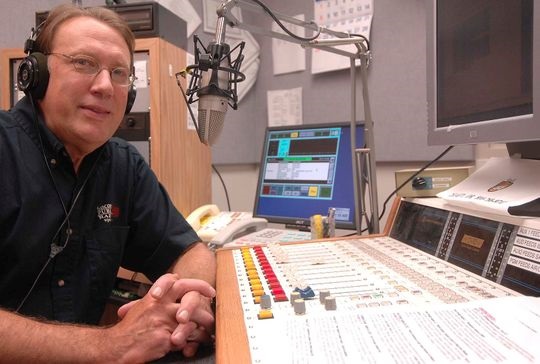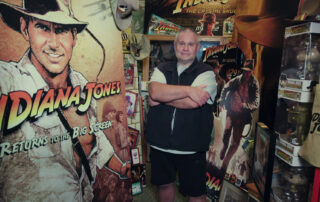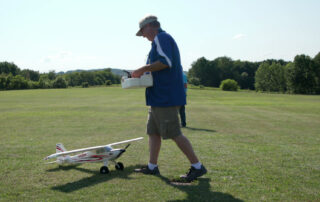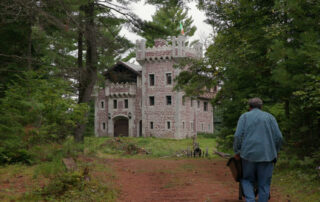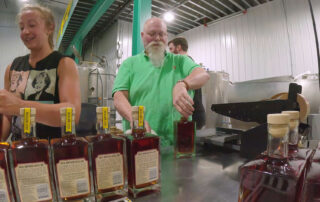Wisconsin Public Radio lost a dear colleague and friend to cancer over the weekend. Glen Moberg covered central Wisconsin for WPR for 15 years. As a reporter and talk show host of WPR’s “Route 51,” Glen’s love for his community was apparent on the airwaves and off.
Rob Mentzer is WPR’s current reporter based in Wausau. He knew Glen for years, and he shares this essay on his legacy.
==
I had been a reporter for a little more than two years when Glen Moberg called me about getting together a senatorial debate in Wausau ahead of the 2010 elections.
I liked covering politics but certainly had no idea how to organize a debate, let alone one for a race of national interest. Glen knew. He wanted to pull together a coalition of Wausau’s TV stations, WPR and the Wausau Daily Herald (where I was employed) as partners in the debate, and that way to persuade the campaigns of U.S. Sen. Russ Feingold and challenger Ron Johnson that it was worth coming to central Wisconsin for the event.

Rob Mentzer and Glen Moberg participate in the 2010 Senate debate in Wausau, Wisconsin. The debate aired on C-SPAN.
After months of wrangling and weeks of writing and rewriting questions, we were standing nervously (well, I was nervous) in the hallway outside the theater before the debate. I remember in the pregame chatter Glen said to me, “Your question is going to be the bomb,” except he added a fragrant, multisyllabic profanity between “the” and “bomb.” It made me laugh then and still does now.
The point of that story is not my question, which was fine as far as these things go, or the debate that Glen made happen, which was a genuine addition to the public’s understanding of issues in an important campaign. The point of the story is that Glen understood in that moment that I was nervous about what felt like a big moment in my journalism career, and he took the time to reassure me in a funny, emotionally generous way.
That’s Glen. Others who worked with him have a million stories like it.
Glen died Sunday after a yearlong fight with stomach cancer. The news did not come as a surprise. He had been extraordinarily public about his condition and clear-eyed about his prospects. But it was still a blow.
Glen Moberg was a father of two, a part-time jeweler with his wife Mary Beth, a guitarist and a decorated radio journalist. He was 67 years old.
I work in Glen’s old office. I talk into the microphone Glen talked into and I sit in front of the soundboard Glen ran. When I applied for the job at WPR after a decade at the newspaper, it was to the position Glen vacated when he retired due to his cancer. WPR then split Glen’s position in two; my job reporting for the network and my colleague Shereen Siewert’s job hosting the weekly talk show “Route 51.” Glen did both. Big shoes!
About a week after I started at WPR in the spring, Glen came in (“I wanted to see what you’d done with my office,” he said) and spent a couple of hours with me talking through a number of his old radio scripts and features and showing me a bunch of his sound files and how he’d constructed stories. It was inspirational, in the sense that it inspired me to try my best to make ambitious radio stories. It was moving because he was very sick by then and not doing great and he could have been doing a lot of other things besides helping me.
But it was also, I want to emphasize, super practical and useful to me in concrete ways. He wasn’t there to bless me or inspire me. He came in to teach me things it would help me to know. I asked many questions. I started using some of it in my job literally the next day.
That’s Glen, who was always more generous than he needed to be.
I mainly knew him professionally, as a fine journalist who cared uncommonly about his craft. I certainly can’t claim to have known him the way his closest friends or longtime colleagues knew him. But it happens that we are in a profession, journalism, that is sort of consuming if you love it. Glen made a life around it because he loved it. The support he got from listeners, sources, colleagues, friends after he became ill was all that love and work and care he put into the world coming back to him, at least a little.
“All of our time here is limited and it can end without warning,” Glen wrote in a Facebook post in December that told people of his prognosis. “Show your love for the people in your life.”
One Friday night in May, after I had applied some of his radio lessons in a small story, I thought about what he’d said, and I sent him a message thanking him and letting him know that his lessons had made a difference to me. He was at the downtown Wausau bar Malarkey’s at the time, performing music with some local artists. He responded anyway. “You made me smile, Rob!” he wrote.
As it turned out, he had three months to live. Even then, even then he reacted with warmth, humor, love. He couldn’t be any other way.
==
WPR’s Glen Moberg made his final appearance on “Route 51” on February 7, 2019. This time the tables were turned, where he was the guest instead of the interviewer. He said this during that appearance:
“If I could pass along one message to people — which is something I’ve thought about quite a bit since the diagnosis — is treat every day that you’re on this earth like it could be your last day. Be nice to people. If you love somebody, let them know you love them. Do nice things for folks. Be careful when you’re on the internet. If you’ve got a nasty email or a nasty response that you want to send somebody, don’t do it unless it’s something that you would say to that person face-to-face. And I think we could all use a lot of civility in our day-to-day interactions. And I think that’s been the focus of my career in broadcasting, is the idea of civility. It’s certainly been the focus of the “Route 51″ show.”
